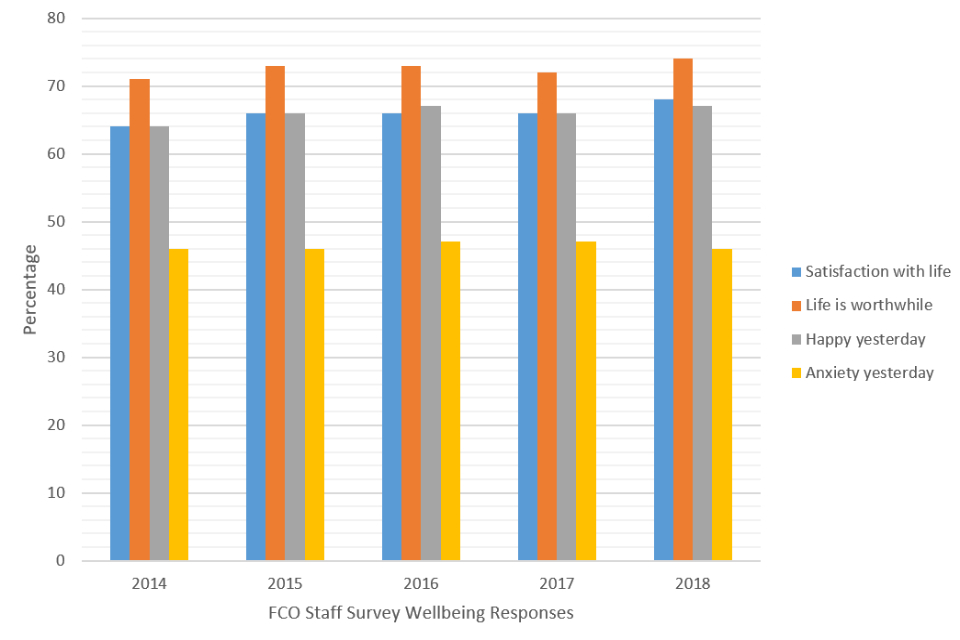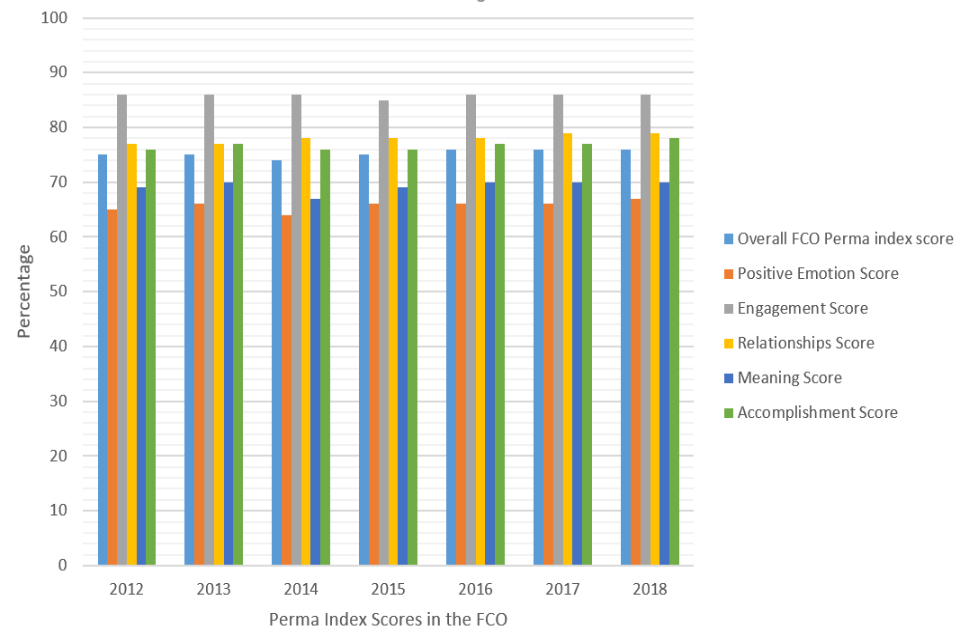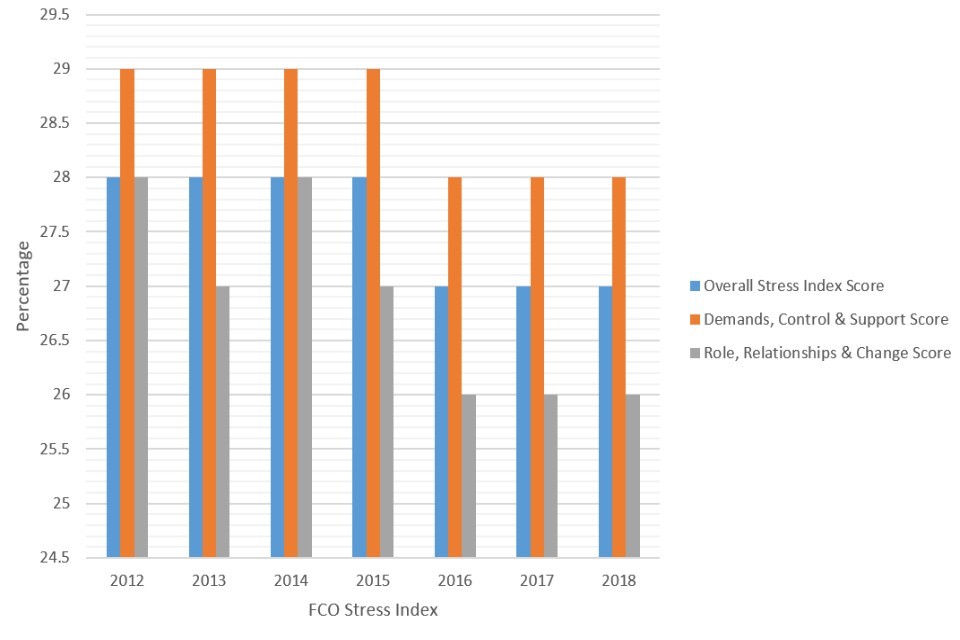Disability, wellbeing and mental health support in the Foreign & Commonwealth Office 2019
Published 14 June 2019
Introduction from Julia Longbottom - Foreign and Commonwealth Wellbeing Champion
In the Foreign & Commonwealth Office (FCO) we recognise that the working environment we create, the relationships we have, the meaning we find in our work, and the way we are recognised for what we do are all essential to our own wellbeing and that of the people we work with. The FCO faces challenges unique to the Civil Service. Our staff can often work in hostile or challenging environments far from home, family and friends. We have been particularly careful to factor in wellbeing and staff resilience as part of our EU Exit work which has involved intensive preparations for a possible no deal exit. The wellbeing of our staff is a key priority, and we will continue to promote wellbeing throughout our global network. That is why we are pleased to be participating for the first time this year in the Voluntary Reporting Framework on staff disability, health and wellbeing.
FCO voluntary reporting on disability
In 2018, 11.9% of FCO employees declared themselves as living with a disability (as a proportion of all those who reported their status). This represents a decrease of 2 percentage points from 2014, when 14.3% declared themselves as disabled. In 2018 the average across the Civil Service was 10%.
The FCO’s Disability Policy Support Team (DPST) work closely with the (DWP led) Civil Service Workplace Adjustment Service (CSWAS) which was launched in April 2015. As part of the closer working partnership with the CSWAS, the DPST use the Civil Service wide Workplace Adjustment Passport (WAP). To complement the Workplace Adjustment Passport, Civil Service HR has developed a list of common reasonable adjustments used across the Civil Service. DPST has a client list of over 700 employees in the FCO.
To date we have trained 55 officers in disability confident leadership during 2019. There is a staff association called ENABLE, which has a network to support officers with disabilities and membership currently stands at 684 members. ENABLE run a series of events and personal blogs throughout our global network and have a senior champion who represents disability issues at board of management level.
The FCO is an active member of the Business Disability Forum (BDF) which helps to reinforce our commitment to people with disability. In November 2018 we hosted their UK awards ceremony at the FCO in London and will be hosting the BDF Disability Smart Awards again in October.
FCO voluntary reporting on mental health and wellbeing
The FCO reported over 3,000 working days lost in 2018 due to poor mental health. We take the view that it is ok not to be ok, and want to empower our staff and their managers to feel confident talking about mental health issues. We have therefore produced management guides to inform our staff how to approach these issues. We have also developed a network of Mental Health First Aiders at home and overseas that currently stands at over 250 officers, who cover a global network in excess of 12,000 staff. We will continue to develop this network over the next few years.
In June 2018 we hosted the first ever Civil Service Conference on Mental Health, which included over 170 delegates from across the public sector, including senior FCO officials, the Civil Service Disability Champion and the Civil Service Wellbeing Champion.
Our strategy
The FCO launched its wellbeing strategy, with mental health at its core, in May 2018. Its 3 aims are:
-
awareness: promote wellbeing and educate ourselves on how we can achieve better wellbeing for all
-
culture: ensure our culture, internal processes and ways of working support our wellbeing
-
empowerment: provide the right tools to enable us to sustain our own wellbeing and support others to do the same
To support the Awareness goal of our strategy, the FCO has been rolling out the Developing Wellbeing Confident Leaders workshop. The aim of this is to help leaders and people at all levels in the FCO to think about how they manage their own wellbeing, how they impact on the wellbeing of others and how they enable and support the wellbeing of their teams and the FCO. As of May 2019, the FCO has trained over 53% of our senior leadership through the Wellbeing Confident Leaders Workshop. To complement this we have also been rolling out the workshop to staff in the delegated grades. The FCO are recipients of the MIND Wellbeing Index Silver Award, which reflects our achievements in promoting staff mental health across our global network.
We have developed an active wellbeing network which currently stands at 514 members. This network is purely voluntary and regularly organises guest speakers to talk to our workforce on all facets of wellbeing, including how to get better sleep and promoting our wellbeing hub/gym. We also support staff via our Employee Assistance Programme (EAP) a confidential, 24/7 counselling service offering the opportunity of resolving and managing both everyday situations and more serious problems, whether of a work or personal nature.
To further educate our staff and line managers, we have developed and rolled out a Good Line Manager Campaign. This includes modules on disability and mental health and provides specific guidance on these issues.
A snapshot of wellbeing in the FCO

Staff Survey wellbeing scores, data available in a separate spreadsheet
We measure Personal Wellbeing levels within FCO through the Civil Service People Survey using the same national statistics that ONS use for the UK population as a whole. Between 2017 and 2018 personal wellbeing levels generally improved among FCO employees with higher levels of life satisfaction, happiness and sense that activities in life are worthwhile (all up between 1 and 2 percentage points based on 2014). These have all improved in the longer run too, with increases between 2014 and 2018 (by between 3 and 4 percentage points). The proportion of employees rating their anxiety as low has been largely stable since 2014. These changes are very small and overall the picture is of stability.

PERMA: positive emotion, engagement, relationships, meaning, and accomplishment
We use a PERMA index to measure the extent to which employees are flourishing. This index combines measures of Positive emotion, Engagement, Relationships, sense of Meaning and sense of Accomplishment (all set out in the table above). In 2018 FCO employees had a PERMA index score of 76%, higher than the median score for the Civil Service as a whole (74%). The index score within FCO was stable between 2017 and 2018 – however there have been longer term improvements with around a +2% increase in the index between 2014 and 2018. Whilst the FCO is moderately above the average it is not significantly different.

FCO stress index, data available in a separate spreadsheet
We calculate a stress index score using the Civil Service People Survey questions aligned to the Health and Safety Executive Stress Management Standards. The higher the index, the more challenging the workplace environment is for stress. Factors include higher workloads, lower control over how to do work, and poorer support from team and manager. The stress index has remained stable over the last year in the FCO, with little change between 2017 and 2018. However, over the longer term it has reduced by around 1 percentage point from 28% in 2014 to 27% in 2018. The FCO has a lower stress index than the Civil Service median (29%).
In conclusion
While the above figures for the FCO show stability or modest improvement over Civil Service the size of the difference is not significant.
The FCO will continue to support wellbeing across our organisation. Our wellbeing approach is closely aligned to Health and Safety policy. It is our aspiration to take wellbeing into account when conducting health and safety audits and new office builds for our overseas estate. We will continue to roll out the Developing Wellbeing Confident Leaders training for both senior leaders and the delegated grades. We will also continue to develop our network of mental health first aiders around the globe. Finally, we will continue to raise mental health and disability issues through our internal blogging and staff events, highlighting inspiring personal stories which enable conversations to take place and reduce the stigma around these topics. This the first year of reporting and we will be in a better position next year to measure progress and determine if our internal policies are having a positive impact.
